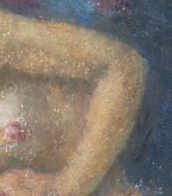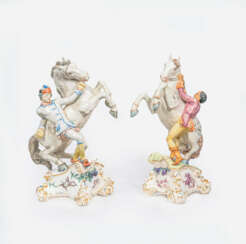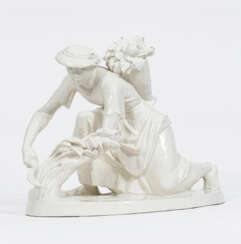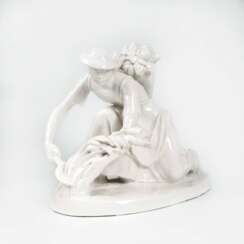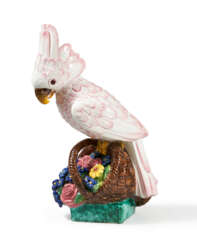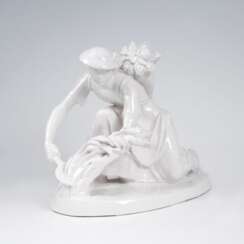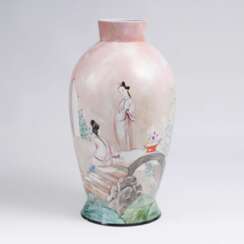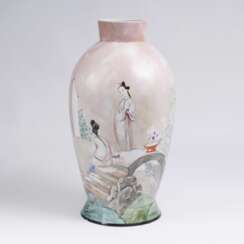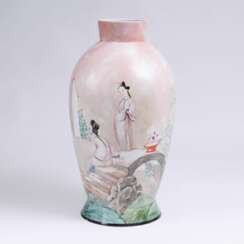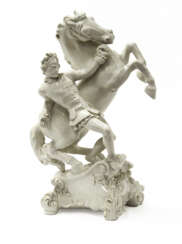Joseph Wackerle (1880 - 1959) — Auction price
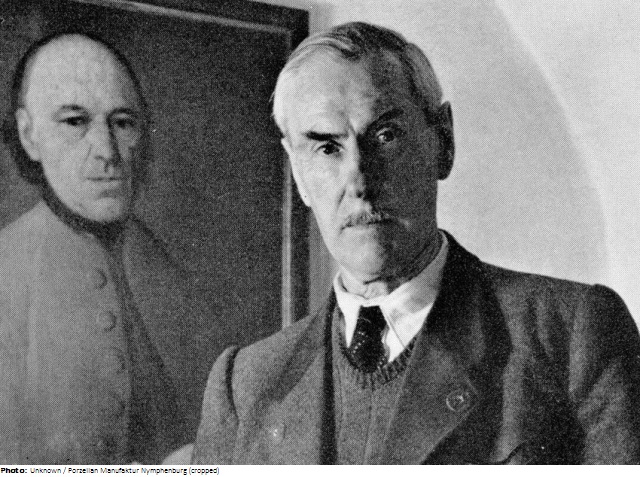
Josef Wackerle was a German sculptor. Educated in Munich, he became the artistic director of the Nymphenburg Porcelain Manufactory at a young age. Wackerle's influence extended beyond porcelain, as he contributed significantly to public art and architecture, particularly in his hometown. His works include various monuments, sculptures, and reliefs that demonstrate his commitment to integrating art within public spaces and everyday life.
Josef Wackerle's talent was recognized internationally, and his sculptures played a part in the art competitions at the 1928 and 1932 Summer Olympics. Despite the complex historical context in which he worked, including the Nazi era, Wackerle continued to receive commissions after World War II, demonstrating his art's enduring appeal. He contributed to the architectural and cultural fabric of Garmisch-Partenkirchen through numerous public artworks, including fountains, monuments, and building decorations.
For collectors and art experts, Josef Wackerle's work represents a blend of technical skill and a deep connection to Bavarian cultural identity. His contributions to porcelain art, particularly with Nymphenburg, highlight his versatility and innovation in working with various mediums.
If you're interested in staying updated on Josef Wackerle's works, particularly in the context of auctions and new discoveries, consider signing up for updates. This subscription will ensure you're informed about new sales and auction events related to Wackerle's art, providing valuable insights for collectors and enthusiasts alike.
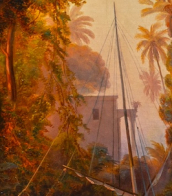

Josef Wackerle was a German sculptor. Educated in Munich, he became the artistic director of the Nymphenburg Porcelain Manufactory at a young age. Wackerle's influence extended beyond porcelain, as he contributed significantly to public art and architecture, particularly in his hometown. His works include various monuments, sculptures, and reliefs that demonstrate his commitment to integrating art within public spaces and everyday life.
Josef Wackerle's talent was recognized internationally, and his sculptures played a part in the art competitions at the 1928 and 1932 Summer Olympics. Despite the complex historical context in which he worked, including the Nazi era, Wackerle continued to receive commissions after World War II, demonstrating his art's enduring appeal. He contributed to the architectural and cultural fabric of Garmisch-Partenkirchen through numerous public artworks, including fountains, monuments, and building decorations.
For collectors and art experts, Josef Wackerle's work represents a blend of technical skill and a deep connection to Bavarian cultural identity. His contributions to porcelain art, particularly with Nymphenburg, highlight his versatility and innovation in working with various mediums.
If you're interested in staying updated on Josef Wackerle's works, particularly in the context of auctions and new discoveries, consider signing up for updates. This subscription will ensure you're informed about new sales and auction events related to Wackerle's art, providing valuable insights for collectors and enthusiasts alike.


Josef Wackerle was a German sculptor. Educated in Munich, he became the artistic director of the Nymphenburg Porcelain Manufactory at a young age. Wackerle's influence extended beyond porcelain, as he contributed significantly to public art and architecture, particularly in his hometown. His works include various monuments, sculptures, and reliefs that demonstrate his commitment to integrating art within public spaces and everyday life.
Josef Wackerle's talent was recognized internationally, and his sculptures played a part in the art competitions at the 1928 and 1932 Summer Olympics. Despite the complex historical context in which he worked, including the Nazi era, Wackerle continued to receive commissions after World War II, demonstrating his art's enduring appeal. He contributed to the architectural and cultural fabric of Garmisch-Partenkirchen through numerous public artworks, including fountains, monuments, and building decorations.
For collectors and art experts, Josef Wackerle's work represents a blend of technical skill and a deep connection to Bavarian cultural identity. His contributions to porcelain art, particularly with Nymphenburg, highlight his versatility and innovation in working with various mediums.
If you're interested in staying updated on Josef Wackerle's works, particularly in the context of auctions and new discoveries, consider signing up for updates. This subscription will ensure you're informed about new sales and auction events related to Wackerle's art, providing valuable insights for collectors and enthusiasts alike.
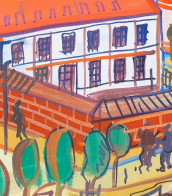

Josef Wackerle was a German sculptor. Educated in Munich, he became the artistic director of the Nymphenburg Porcelain Manufactory at a young age. Wackerle's influence extended beyond porcelain, as he contributed significantly to public art and architecture, particularly in his hometown. His works include various monuments, sculptures, and reliefs that demonstrate his commitment to integrating art within public spaces and everyday life.
Josef Wackerle's talent was recognized internationally, and his sculptures played a part in the art competitions at the 1928 and 1932 Summer Olympics. Despite the complex historical context in which he worked, including the Nazi era, Wackerle continued to receive commissions after World War II, demonstrating his art's enduring appeal. He contributed to the architectural and cultural fabric of Garmisch-Partenkirchen through numerous public artworks, including fountains, monuments, and building decorations.
For collectors and art experts, Josef Wackerle's work represents a blend of technical skill and a deep connection to Bavarian cultural identity. His contributions to porcelain art, particularly with Nymphenburg, highlight his versatility and innovation in working with various mediums.
If you're interested in staying updated on Josef Wackerle's works, particularly in the context of auctions and new discoveries, consider signing up for updates. This subscription will ensure you're informed about new sales and auction events related to Wackerle's art, providing valuable insights for collectors and enthusiasts alike.
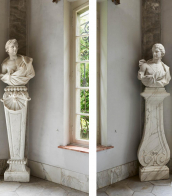

Josef Wackerle was a German sculptor. Educated in Munich, he became the artistic director of the Nymphenburg Porcelain Manufactory at a young age. Wackerle's influence extended beyond porcelain, as he contributed significantly to public art and architecture, particularly in his hometown. His works include various monuments, sculptures, and reliefs that demonstrate his commitment to integrating art within public spaces and everyday life.
Josef Wackerle's talent was recognized internationally, and his sculptures played a part in the art competitions at the 1928 and 1932 Summer Olympics. Despite the complex historical context in which he worked, including the Nazi era, Wackerle continued to receive commissions after World War II, demonstrating his art's enduring appeal. He contributed to the architectural and cultural fabric of Garmisch-Partenkirchen through numerous public artworks, including fountains, monuments, and building decorations.
For collectors and art experts, Josef Wackerle's work represents a blend of technical skill and a deep connection to Bavarian cultural identity. His contributions to porcelain art, particularly with Nymphenburg, highlight his versatility and innovation in working with various mediums.
If you're interested in staying updated on Josef Wackerle's works, particularly in the context of auctions and new discoveries, consider signing up for updates. This subscription will ensure you're informed about new sales and auction events related to Wackerle's art, providing valuable insights for collectors and enthusiasts alike.
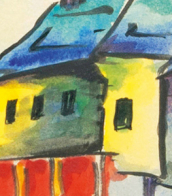

Josef Wackerle was a German sculptor. Educated in Munich, he became the artistic director of the Nymphenburg Porcelain Manufactory at a young age. Wackerle's influence extended beyond porcelain, as he contributed significantly to public art and architecture, particularly in his hometown. His works include various monuments, sculptures, and reliefs that demonstrate his commitment to integrating art within public spaces and everyday life.
Josef Wackerle's talent was recognized internationally, and his sculptures played a part in the art competitions at the 1928 and 1932 Summer Olympics. Despite the complex historical context in which he worked, including the Nazi era, Wackerle continued to receive commissions after World War II, demonstrating his art's enduring appeal. He contributed to the architectural and cultural fabric of Garmisch-Partenkirchen through numerous public artworks, including fountains, monuments, and building decorations.
For collectors and art experts, Josef Wackerle's work represents a blend of technical skill and a deep connection to Bavarian cultural identity. His contributions to porcelain art, particularly with Nymphenburg, highlight his versatility and innovation in working with various mediums.
If you're interested in staying updated on Josef Wackerle's works, particularly in the context of auctions and new discoveries, consider signing up for updates. This subscription will ensure you're informed about new sales and auction events related to Wackerle's art, providing valuable insights for collectors and enthusiasts alike.


Josef Wackerle was a German sculptor. Educated in Munich, he became the artistic director of the Nymphenburg Porcelain Manufactory at a young age. Wackerle's influence extended beyond porcelain, as he contributed significantly to public art and architecture, particularly in his hometown. His works include various monuments, sculptures, and reliefs that demonstrate his commitment to integrating art within public spaces and everyday life.
Josef Wackerle's talent was recognized internationally, and his sculptures played a part in the art competitions at the 1928 and 1932 Summer Olympics. Despite the complex historical context in which he worked, including the Nazi era, Wackerle continued to receive commissions after World War II, demonstrating his art's enduring appeal. He contributed to the architectural and cultural fabric of Garmisch-Partenkirchen through numerous public artworks, including fountains, monuments, and building decorations.
For collectors and art experts, Josef Wackerle's work represents a blend of technical skill and a deep connection to Bavarian cultural identity. His contributions to porcelain art, particularly with Nymphenburg, highlight his versatility and innovation in working with various mediums.
If you're interested in staying updated on Josef Wackerle's works, particularly in the context of auctions and new discoveries, consider signing up for updates. This subscription will ensure you're informed about new sales and auction events related to Wackerle's art, providing valuable insights for collectors and enthusiasts alike.
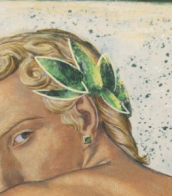

Josef Wackerle was a German sculptor. Educated in Munich, he became the artistic director of the Nymphenburg Porcelain Manufactory at a young age. Wackerle's influence extended beyond porcelain, as he contributed significantly to public art and architecture, particularly in his hometown. His works include various monuments, sculptures, and reliefs that demonstrate his commitment to integrating art within public spaces and everyday life.
Josef Wackerle's talent was recognized internationally, and his sculptures played a part in the art competitions at the 1928 and 1932 Summer Olympics. Despite the complex historical context in which he worked, including the Nazi era, Wackerle continued to receive commissions after World War II, demonstrating his art's enduring appeal. He contributed to the architectural and cultural fabric of Garmisch-Partenkirchen through numerous public artworks, including fountains, monuments, and building decorations.
For collectors and art experts, Josef Wackerle's work represents a blend of technical skill and a deep connection to Bavarian cultural identity. His contributions to porcelain art, particularly with Nymphenburg, highlight his versatility and innovation in working with various mediums.
If you're interested in staying updated on Josef Wackerle's works, particularly in the context of auctions and new discoveries, consider signing up for updates. This subscription will ensure you're informed about new sales and auction events related to Wackerle's art, providing valuable insights for collectors and enthusiasts alike.
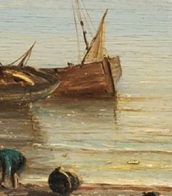

Josef Wackerle was a German sculptor. Educated in Munich, he became the artistic director of the Nymphenburg Porcelain Manufactory at a young age. Wackerle's influence extended beyond porcelain, as he contributed significantly to public art and architecture, particularly in his hometown. His works include various monuments, sculptures, and reliefs that demonstrate his commitment to integrating art within public spaces and everyday life.
Josef Wackerle's talent was recognized internationally, and his sculptures played a part in the art competitions at the 1928 and 1932 Summer Olympics. Despite the complex historical context in which he worked, including the Nazi era, Wackerle continued to receive commissions after World War II, demonstrating his art's enduring appeal. He contributed to the architectural and cultural fabric of Garmisch-Partenkirchen through numerous public artworks, including fountains, monuments, and building decorations.
For collectors and art experts, Josef Wackerle's work represents a blend of technical skill and a deep connection to Bavarian cultural identity. His contributions to porcelain art, particularly with Nymphenburg, highlight his versatility and innovation in working with various mediums.
If you're interested in staying updated on Josef Wackerle's works, particularly in the context of auctions and new discoveries, consider signing up for updates. This subscription will ensure you're informed about new sales and auction events related to Wackerle's art, providing valuable insights for collectors and enthusiasts alike.
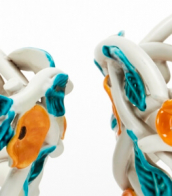

Josef Wackerle was a German sculptor. Educated in Munich, he became the artistic director of the Nymphenburg Porcelain Manufactory at a young age. Wackerle's influence extended beyond porcelain, as he contributed significantly to public art and architecture, particularly in his hometown. His works include various monuments, sculptures, and reliefs that demonstrate his commitment to integrating art within public spaces and everyday life.
Josef Wackerle's talent was recognized internationally, and his sculptures played a part in the art competitions at the 1928 and 1932 Summer Olympics. Despite the complex historical context in which he worked, including the Nazi era, Wackerle continued to receive commissions after World War II, demonstrating his art's enduring appeal. He contributed to the architectural and cultural fabric of Garmisch-Partenkirchen through numerous public artworks, including fountains, monuments, and building decorations.
For collectors and art experts, Josef Wackerle's work represents a blend of technical skill and a deep connection to Bavarian cultural identity. His contributions to porcelain art, particularly with Nymphenburg, highlight his versatility and innovation in working with various mediums.
If you're interested in staying updated on Josef Wackerle's works, particularly in the context of auctions and new discoveries, consider signing up for updates. This subscription will ensure you're informed about new sales and auction events related to Wackerle's art, providing valuable insights for collectors and enthusiasts alike.
